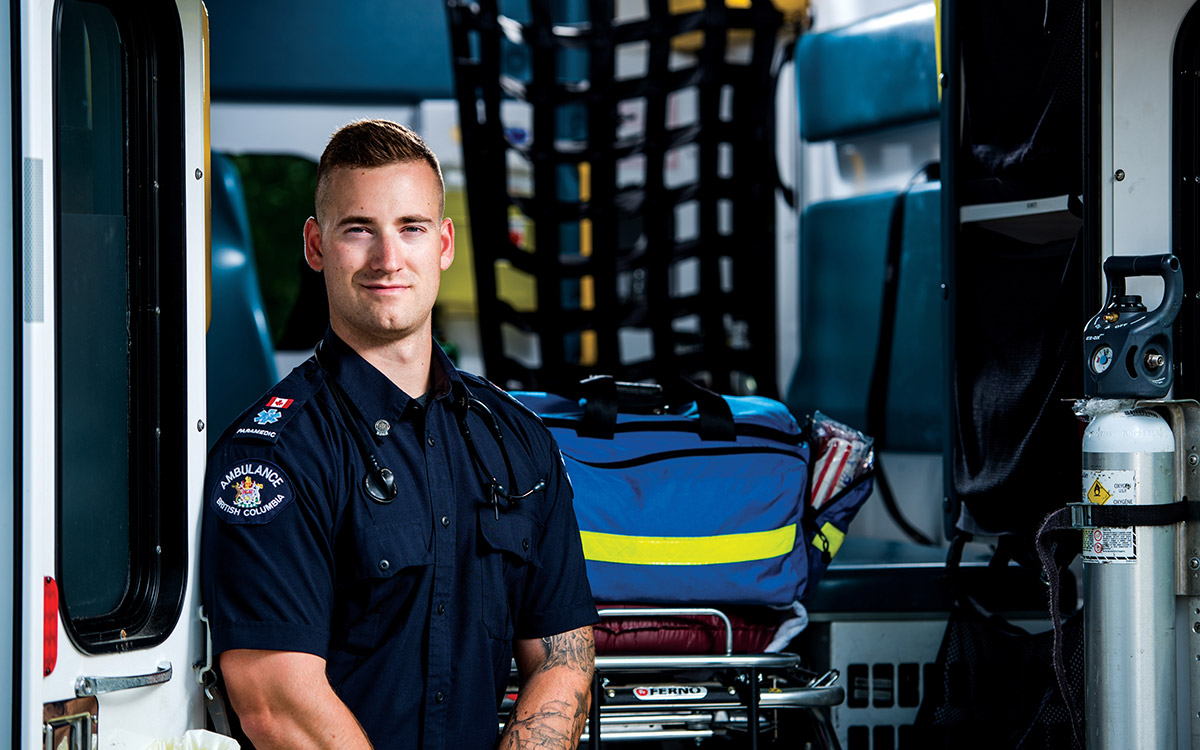The call came in as a biking injury in northern Chilliwack, recalled Justin Woodroff, a 24-year-old paramedic with the BC Ambulance Service.
The patient had crashed on one of the jumps at the bike park.
When he and his partner arrived, Justin could see this was no routine injury.
“He was under a blanket but we could tell as soon as we got there that his femur was obviously fractured and angulated up towards his torso.”
Thanks to his education in the primary care paramedic program at Justice Institute of British Columbia (JIBC), and his work experience since graduating, Justin was able to make the right decisions to care for the patient. They called for an advanced life support unit and a helicopter staffed with critical care paramedics to fly the patient to hospital.
It’s the sort of case he thrives on, the type that gives him the opportunity to use a lot of his education, tools, skills and problem-solving abilities to help someone in need. Paramedicine is a career path Justin started on at age 19 when he began volunteering with the Cultus Lake Fire Department.
“After responding to various emergencies with the fire department I was hooked on emergency medicine,” he said, adding since high school he had always envisioned working in a science or medical-related field so it was a natural fit.
Little tools that we learn from these really senior instructors who have been in the service for a long time - they've seen everything twice - those are really invaluable
It was while volunteering as a firefighter that he took a first responder training program. The instructor encouraged a few of the volunteers to do the emergency medical responder (EMR) program if they wanted to improve their chances of getting firefighter jobs.
Justin took that advice, completing the EMR program at JIBC’s Chilliwack campus. But it was there that he met students taking the primary care paramedic (PCP) program, and in chatting with them decided to pursue paramedicine instead.
He said his PCP education at JIBC taught him all the technical skills he needs in the job, but it’s the lessons based on the lengthy experience of his instructors that often make a tangible difference.
“Little tools that we learn from these really senior instructors who have been in the service for a long time – they’ve seen everything twice – those are really invaluable,” he said.
For instance, bedside manner is not something paramedic students can learn in a textbook, but it’s a bigger part of the job than the public realizes, and it’s all part of the education paramedic students receive at JIBC, he said.
In the case of the bike accident, “He’s in pain, he can see his leg’s not the way it’s supposed to be, he’s kind of in shock and so is everyone else at the scene. So you’re not really caring for just one person at this point in time you’re also trying to help everyone else who’s involved.”
In addition to learning from instructors who are still active in the field, a benefit of attending JIBC is the Institute’s involvement and relationship with a wide variety of emergency services agencies. That often results in scenario training that involves students and professionals from fields as diverse as police, fire, paramedic and emergency management personnel, all learning to work together as they would need to in the real world.
“These connections, they’re pretty vital because outside of what we learn in the textbook it’s that real-world stuff that’s more so important, the logistical and social side of things, that without these relationships can make the job a little tougher.”
Now three years into his career, Justin is continuing his education by working towards his Diploma in Health Sciences at JIBC. After that he’s considering a Bachelor’s in Health Sciences at Thompson Rivers University, which is now much easier to accomplish thanks to a recent credit-transfer agreement with JIBC.
In the meantime, he’s enjoying life as a paramedic.
“It’s so dynamic. You never know what kind of call’s going to come in. There’s a lot of social interaction, a lot of interaction out on the streets and inside communities and homes, you don’t really get that with any other field of work.”
For more information on the JIBC Paramedic Academy, click here.
